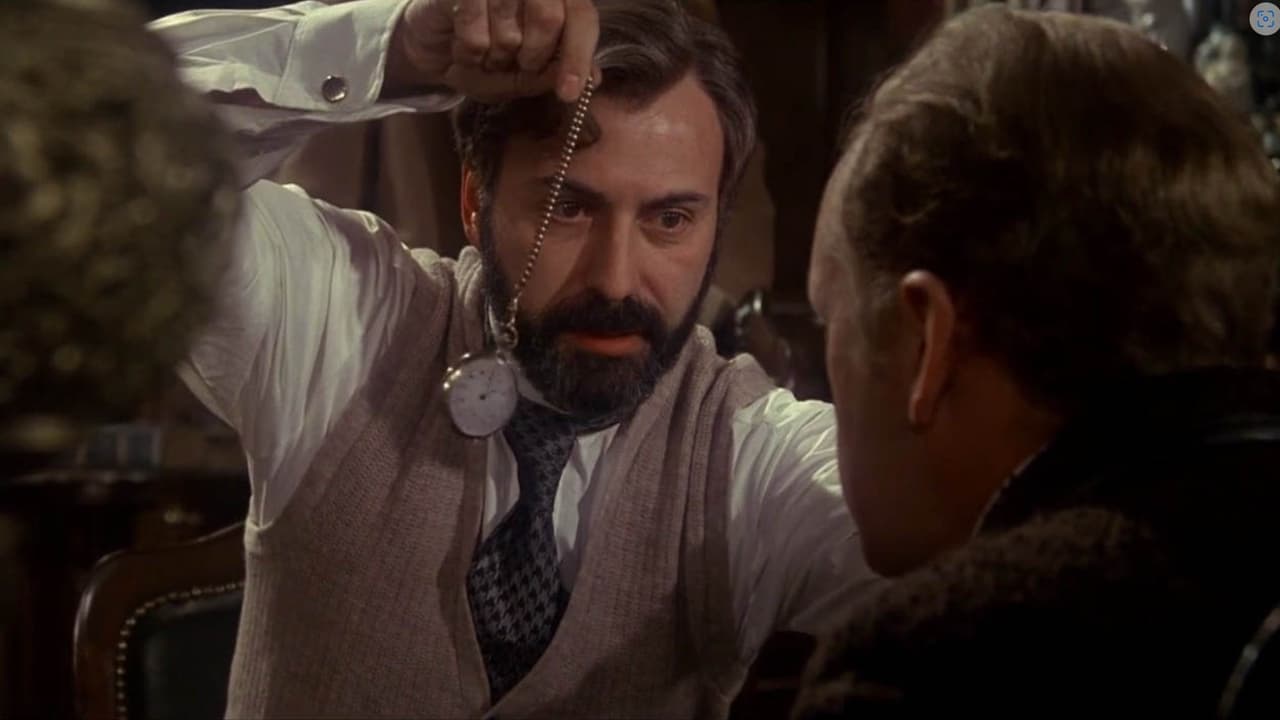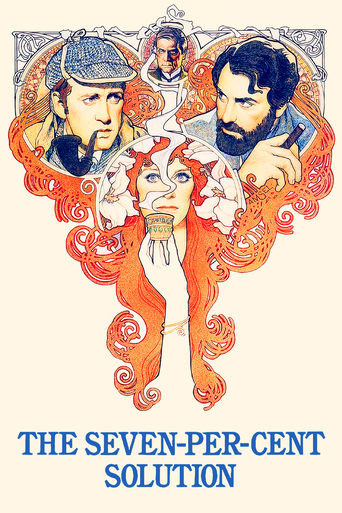



Well Deserved Praise
Really Surprised!
Close shines in drama with strong language, adult themes.
View MoreOne of the most extraordinary films you will see this year. Take that as you want.
View MoreOnce the mystery got underway, I really enjoyed this movie.I wish it had spent less time at the beginning taking us into the very realistic details of Holmes' cocaine addiction. It does give Alan Arkin a chance to show what a very fine actor he is, but I confess I didn't particularly enjoy watching him suffer so.I admit that when we find out what has happened to Miss Devereux, and why, it seems almost silly - and therefore quite different from the early tone of the movie - but that does lead to a lot of lighthearted dueling, etc., on a train - two trains, actually - flying through the Balkan countryside.And a "borrowing" from *Twenty Thousand Leagues under the Sea*, when the second train runs out of coal.Still, if you can get through the seriousness of the first part, the rest of the movie is fun.And it even has a rather tacked-on, unexpected romantic end.
View MoreDelving into pseudo-history, Watson (Robert Duvall) gets a drug addicted and neurotic Holmes (Nichol Williamson) to see the father of psychology, Sigmund Freud (Alan Arkin) in a last ditch effort to cure him. However, Holmes must also work a case involving a shady foreign magnate and a beautiful young actress (Vanessa Redgrave), not permitting resurfacing demons to get in the way of his powers.Star Trek veteran Nicholas Meyer's Holmes tale is a fun and surprisingly smart ride. The combination of two geniuses like Holmes and Freud actually lead to some really fascinating scenes as the two size each other up, each intrigued by the other's somewhat unorthodox methods and beliefs, as well as contrast their behaviours. This is supported by the rapport between a subdued and pensive Arkin, and a maverick Williamson who can veer from pathetic and crumbling to imposing and commanding at the drop of a deerstalker. Indeed, the film explores a darker and much more human side to Holmes than most adaptations, delving into his past and the depths of his childhood that later informed his crime fighting abilities.Now this is not to say everything else is a slack: Duvall holds a decent British accent and is suitably supportive and patient as Watson, Redgrave is doe eyed and rather nervous as the troubled actress, and veteran Herbert Ross directs with a swift hand and tight pacing, taking us from the fog of London to the monuments of Vienna and even the top of speeding trains for the climax in good time. Really, complaints are fairly minor, and are simply circumstantial of this type of production: Laurence Olivier is wasted as a rather weak and whiny Moriarty, little more than a cameo, and the film could've gone even more introspective with Holmes and Freud had it not also been bound to being a moderately budgeted adventure thriller, especially in its second half.In that sense, 'Seven Per Cent' may have benefited remaining a book rather than a film, but what we got was still very good and one of my favourite film versions of Doyle's master sleuth.
View MoreNicholas Meyers' tale bring the neurotic, drug-addicted Sherlock Holmes together with the Father of Psychoanalysis, Sigmund Freud, in turn-of-the-century Vienna. (Actually Prague.) It's one of those novel ideas that people have during a bull session and too many lattés. Other films have pitted Holmes against his contemporary, Jack the Ripper, but though the notion has promise it's never worked too well because, after all, Jack the Ripper got away. One pastiche had Holmes a visitor from the future. They will stop at nothing.There are pitfalls in any story that makes companions of two famous people, even if one of the characters is fictional. Mainly, giving too much weight to one or the other in the plot, inducing an imbalance that leaves one of the characters not much more than an observer. It doesn't happen here. Meyers gives both geniuses equal time. And they both complete their tasks. Holmes solves a somewhat cloudy mystery. Freud cures Holmes of his addiction AND his neurotic obsession with Professor Moriarty, played with mousy disquiet by Lawrence Olivier, whose skill hasn't declined with age.The supporting cast does well enough. Samantha Eggar, she of the elegant yet sensual features, is the wife of Doctor Watson, Robert Duvall, with a vaudeville British accent, something like Chico Marx's Italian accent. Jeremy Kemp is outstanding as the anti-Semitic Baron von Leinsdorf. He's a great German, even if he's English. He's better at being a German, usually a nasty one, than most German actors, with the exception of Otto Preminger. I revel in Kemp's pebbly complexion and haughty demeanor, though. And he's done superb work in more demanding roles, as in "The Blue Max." The German accent of Anna Quayle, as Freud's housekeeper, is as ludicrous here as it was in "Casino Royale." John Addison's musical score isn't overdone. It's apt and sometimes bumptiously comic, as during the tennis duel between Freud and von Leinsdorf. The art direction and set dressing are convincing. (Plenty of brass, scarlet carpets, and delicate green ferns.) Prague has recently been a serviceable stand in for other European cities, since it was never bombed into oblivion during the war and you can still find ancient buildings and cobblestone streets. Somebody got Freud's Vienna street address right -- Berggasse 19. The façade even LOOKS like Freud's real residence.Vanessa Redgrave appears as a kidnapped soprano who is tracked down by Holmes, Freud, and Watson. The climax has two speeding old-fashioned trains chasing one another and a saber duel atop one of the cars. Not a moment of it is to be taken seriously. Holmes solves his case, the kidnapped beauty; Freud cures his case, Sherlock Holmes
View MoreI resent tampering with success, and if you compare this opus to the Granada Television series with Jeremy Brett as Holmes you will see what I mean. I am not impressed with clever take-offs on beloved characters of literature; or real life for that matter. Now you know how I feel.This film, then, in my opinion, has a silly plot; too many underdeveloped characterizations; and depends too much on Holmes' drug addiction and the invention with Sigmund Freud. Its pace is too fast, and that I must blame on Mr. Williamson and his director; and many of the very fine actors are woefully underused or ignored. Surely these experienced thespians were not cowed by this unusually manic portrayal of Sherlock Holmes, but it seems so. Alan Arkin seems to struggle against odds for his time on camera.I will grant that it is interesting, that Mr. Williamson is a great presence, and that the scenery is wonderful. Other than that, I submit that it is a disappointing waste of time. So, let's move on.
View More